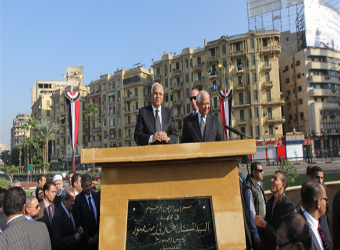Egypt’s military-backed regime is attempting to win hearts and minds by setting up memorial sculptures at sites of protests where its army and police gunned down demonstrators.
Residents and passers-by in Cairo’s Tahrir Square, made famous the world over by the 2011 revolution, have watched agog and puzzled in recent days as a circular stone creation has begun to take shape in the grass-covered central roundabout.
On Sunday, the authorities announced it would be unveiled on the eve of Tuesday’s anniversary of the so-called Mohamed Mahmoud massacre, several days of protests in 2011 when scores of demonstrators against the then interim Supreme Council of the Armed Forces were shot dead on the street of that name that leads away from the Square.
In addition, several more lost eyes to a central security force marksman who was later convicted of deliberately targeting them with birdshot.
The memorial is the second in a sequence. Earlier this month, another sculpture consisting of two angular arms, representing the police and army, protecting a silver orb, representing the people, was completed in the square in front of Rabaa al-Adawiya Mosque, where the army killed more than 600 Muslim Brotherhood demonstrators in August.
This sudden outburst of public art has angered those revolutionary youth movements who opposed both the previous and current interim military rulers, as well as the Muslim Brotherhood’s President Mohamed Morsi, who reigned for a year before being overthrown by his own defence minister.
“The killer is building a memorial to his victims,” said Sally Touma, one youth activist. She also criticised the Muslim Brotherhood’s decision to hold rallies on the anniversary, when it had not taken part in the protests.
“They kill the people and then celebrate them. The Muslim Brotherhood also betrayed us at the time of Mohamed Mahmoud.
“The people are now polarized between the camp of the army and the camp of the Muslim Brotherhood, and what the Mohamed Mahmoud memorial reveals is that they are both criminals, the one who killed and the one who betrayed.”
The military has attempted to argue ever since it seized back power on July 3 from Mr Morsi that it was acting in line with the principles of the original revolution against President Hosni Mubarak in 2011, even though he was also a general.
The government has also given a frosty reception to a new initiative by the Muslim Brotherhood to reopen negotiations about the country’s future. The Brotherhood had previously refused to hold talks until Mr Morsi was returned to power, but he is currently in prison facing charges of incitement to murder.
In a statement on Saturday, the Brotherhood-led “Anti-Coup Alliance” dropped that precondition and called on “all revolutionary forces and political parties and patriotic figures to enter a deep dialogue on exiting the current crisis”.
The authorities made no immediate formal response, but ministers said there could be no “reconciliation” with those on trial, or without Brotherhood recognition of the new authorities’ own blueprint for future political development.
Source: The Telegraph


